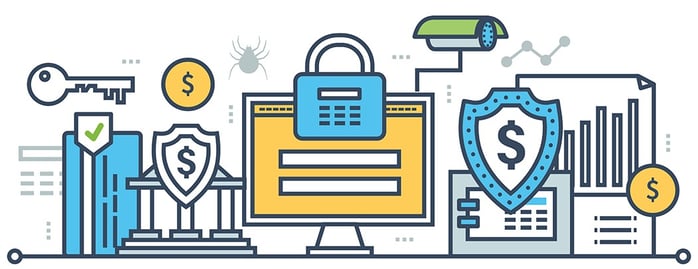Unfortunately, most company management still believes that their organization is safe and secure because they are too small to be targeted, are 100% compliant, have never been breached in the past or have already invested resources into staff or other cybersecurity measures – this is just not true...
Cybersecurity is no longer just an IT issue; it is a critical business issue that requires a focus on integrating security into all aspects of your people and business processes. As cyber threats evolve in sophistication, so must the defenses of companies, starting with its people. A balanced cybersecurity perspective is essential to ensure long-term resiliency, protection of vital data, as well as find ways to avoid unnecessary downtime and ensure compliance.
Today's data-driven organizations face high-security risks, and the news in 2017 was chock full of cybercrime headlines. From Petya (and NotPetya), to WannaCry, Equifax and countless other cyber attacks directed to and from nation states, it is clear the cybersecurity industry is not going to see a decrease in budgetary spending anytime soon. Self-healing BIOS, self-encrypting drives, and pre-boot authentication are just some of the pioneering ways cybercriminals are illegally browsing, stealing, destroying or otherwise corrupting company and individuals' private information.
The question facing businesses now is not if they will be a target of a cybercrime but when.
Unfortunately, most company management still believes that their organization is safe and secure because they are too small to be targeted, are 100% compliant, have never been breached in the past or have already invested resources into staff or other cybersecurity measures – this is just not true.
There are countless internal and external threats facing businesses every day, and without an on-going process of discovering, correcting and preventing security problems your organization may still be at risk.
Internal threats like weak passwords, poor patch management, disgruntled employees, outdated standards/policies and frameworks, insufficient third-party management, poor BYOD policies and behaviors can all leave your business vulnerable. Externally, there is competition and government regulation to worry about, as well as dormant malfeasant code, opportunists, account hijacking, DNS or targeted attacks, malicious code, viruses, hacking, physical security attacks, loss of credit card information and more. Nothing is guaranteed you are 100% protected, but practicing good cyber hygiene is the best way to protect yourself, your workplace, and data from cyberattacks.
One simple thing you and your organization should consider, ensuring you are not an easy target, is to invest in an Information Security Risk Assessment (ISRA). An integral part of a risk management process, ISRAs are designed to provide appropriate levels of security for information systems. A security audit, by a qualified and experienced cybersecurity firm, is the first step in the process of understanding and responding to factors that may lead to a failure in the confidentiality, integrity or availability of an information system. In addition to an ISRA, there are many more layers to cyber protection available to organizations including threat monitoring, access to an around the clock Security Operations Center (SOC) for on-site and remote cyber support, in-depth vulnerability assessments, penetration testing, legal and cyber insurance advice, and more.
By assessing your information systems and business processes, you can effectively keep your business protected against known threats while increasing your resistance to new and unforeseen risks as they evolve.
Interested in learning more about security audits, assessments, proactive monitoring, data backup/recovery, or how to make your business and its data more secure? Schedule a free call with our experienced IT security Philadelphia consultants today:
How to Protect Your Business from Ransomware
Practicing good cyber hygiene is the best way to protect yourself, your workplace, and data from cyberattacks. A few technical considerations are listed below. All of them you may do on your own or contact LANTIUM for assistance:
- Enable strong spam filters, and scan all inbound and outbound emails with filters
- Configure firewalls to block access to known malicious IP addresses
- Patch all operating systems, software, firmware
- Set antivirus and antimalware programs to scan automatically
- Manage use of sensitive accounts on the principle of least privilege
- Consider disabling Remote Desktop Protocol
- Use application whitelisting and backup data regularly
- Conduct annual penetration testing
The truth is, there’s no excuse for leaving yourself or your business exposed. Please read our recent post, Seven Simple Habits to Protect Your Business from Ransomware, for things to do now for basic data breach prevention, minimize risk, and to keep you, your end users and business safe.
What to Do if You’re Infected
Panic and worry can be overwhelming once you realize that your computer may have been compromised. However, it’s not over for your computer and all of your files. If you believe you have been infected by a virus, trojan, worm, ransomware, or cryptolocker, there is still a chance to restore your computer to the state it was prior to infection, quickly, and without further damage or loss of productivity.
If you believe your computer may be infected, or if your organization has had IT security and performance issues in the past, Lantium can help! Our Critical Care support team is available for our clients 24x7x365.




